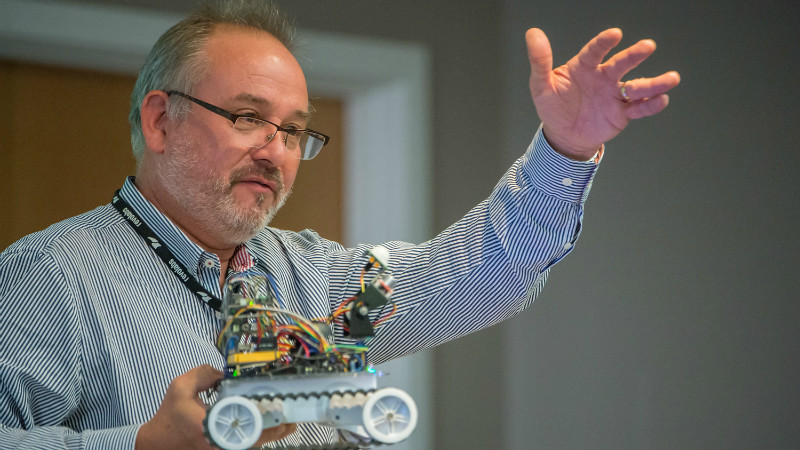The public engagement efforts of six researchers from across the University were celebrated at the finals for this year’s Vice-Chancellor’s Public Engagement with Research Awards, held recently on campus.
Finalists, including three postgraduate researchers, were challenged to engage the audience on the topic of their research in a captivating and entertaining way using either a prop, image or slide and in no more than six minutes.
Those attending learnt about a variety of subjects our researchers are involved in, from advances in robotics and AI to understand more about social interactions, to expanding provision and raising awareness of the plight of asylum-seeking children in need of foster carers.
Award Winners
This year's Vice-Chancellor’s Award for Public Engagement with Research was taken by Dr Afroditi Stathi (Health) whose active ageing research programme, including the two-year project Project ACE: Active Connected, Engaged, has demonstrated exemplary practice in public engagement.
Afroditi’s work seeks to develop low-cost and sustainable programmes supporting older people to enjoy better health and well-being while staying socially-connected for longer. The findings of Project ACE have delivered important messages to policy-makers having been referenced by Public Health England. Afroditi is now working on a large study, the REtirement in ACTion, a 12-month physical and social activity programme targeting people with mobility difficulties hoping to achieve similar impacts. Through her role as Impact Director and as Co-Director for the Health Integration Team, she has championed public engagement with research within our Department for Health.
PhD student Daniela De Angeli (Computer Science) won the Vice-Chancellor’s Postgraduate Prize for Public Engagement with Research for her engaged research that explores how games can be used to create museum experiences that are both entertaining and meaningful. Daniela is drawing on her computer science background to show how interactive games can be designed to bring museums to life through interactive exhibits.
She has been involved in running Game Jams where members of the public come together to create games based on museum objects, and she is the driving force behind the Bath Cultural Heritage Network for staff within the University who work with, or are interested in working with museums in the area.
Strengthening research with public engagement
On winning, Afroditi said: “It is a great honour to receive this award. I am a firm believer that public engagement strengthens research and increases its potential for impact and adoption at a large scale. I greatly appreciate the way that the University actively supports public engagement and the passion and expertise available through the Public Engagement Unit. The award will support the development of a regional network of citizen scientists and the activities of a global citizen science network aiming at advancing health equity.”
Daniela added: "Public engagement is such a vital part of my research. Winning this award is not just supporting my passion for organising events and engaging with people, it is also encouraging my research. I am more than ever convinced that games are incredible communication tools that can actively involve the public."
Other finalists for the Vice-Chancellor’s Award for Public Engagement with Research included Dr Justin Rogers, who talked about his work with local foster agency TACT to increase awareness of the needs of asylum-seeking child refugees among potential foster carers, and Dr Janet Goodall, who spoke about her work to embed a new approaches to parental engagement in children’s education.
Engaged PhD community
The Vice-Chancellor’s Postgraduate Prize for Public Engagement with Research was contested by our Science PhDs. Other finalists included Emma Sackville and Rob Wortham.
Emma, who was also a runner-up in this year’s 3MT, is researching molecular electrocatalysts for energy conversion and talked about materials that can do the water-splitting reaction - an important step in the production of alternative, non-polluting fuels. Rob focuses on future robotics and his talk considered the challenges that lie ahead for the industries involved but also for wider society as we adapt to AI becoming more and more a way of life.
Professor Jonathan Knight (Pro-Vice-Chancellor, Research) who headed up the judging panel said: “We were particularly struck by the calibre of finalists at this year’s Engage awards. Each of them demonstrated effectively how integrating public engagement throughout the life cycle of research yields important results whether that be through creating a user network to test a product or ideas, or in gauging feedback about a new activity or programme to hone thinking on a topic. Congratulations to all our finalists.”
The other judges at the event were Professor David Galbreath (Dean of the Faculty of Humanities & Social Sciences), Dr Jenni Chambers (Head of Public Engagement, Research Councils UK) and Dr Kit Yates (2016 Vice-Chancellor’s Public Engagement with Research Winner).

